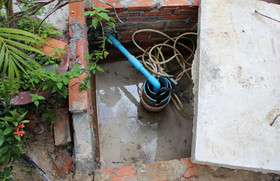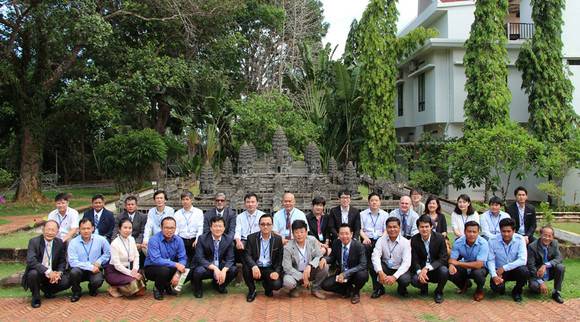Climate change’s ties to groundwater focus of regional meeting
28.06.2016Groundwater is essential to countries’ ability to adapt to climate change, and the resource is also directly affected by the phenomenon. Several areas in the Mekong Region are highly vulnerable to the effects of climate change, leading to a pressing need to better understand this relationship and build a coherent, collective response to it.
 It was with this in mind that UNESCO Bangkok organized the Workshop on Climate Change and Groundwater Resources in the Mekong River Basin, along with the Korea Institute of Geology, Mining & Materials (KIGAM), the Coordinating Committee for Geoscience Programmes in East and Southeast Asia (CCOP) in Bangkok and Cambodia’s Ministry of Mines and Energy.
It was with this in mind that UNESCO Bangkok organized the Workshop on Climate Change and Groundwater Resources in the Mekong River Basin, along with the Korea Institute of Geology, Mining & Materials (KIGAM), the Coordinating Committee for Geoscience Programmes in East and Southeast Asia (CCOP) in Bangkok and Cambodia’s Ministry of Mines and Energy.
The objective of the workshop, which took place on 1-2 June in Sihanoukville, Cambodia, was to provide a platform for Mekong countries to share best practices in assessing availability of groundwater resources under climate change and to support member countries in preparing sustainable groundwater management plans.
The workshop was attended by 28 participants from six countries as well as resource people from the Republic of Korea (KIGAM, private company C&H, the Gwangju Institute of Science and Technology [GIST], EcoEnergySolution), UNESCO, the United States Geological Survey and CCOP.
Keynote presentations given by UNESCO, KIGAM, CCOP, USGS, C&H and EcoEnergySolutions offered an overview of potential issues related to groundwater and climate change in the Mekong sub-region as well as ongoing and completed activities and monitoring systems. A highlight was also the discussion of new technological applications that could be applied to solving groundwater problems.
Country reports presented at the workshop from six Mekong countries (Cambodia, Lao PDR, Myanmar, Singapore, Thailand and Viet Nam) addressed major issues and the status of groundwater management amid climate change.
Strategies for potential collaboration between neighbouring countries in the Mekong sub-region on how best to manage groundwater resources and adapt to future climate change was also a key focus of the workshop.
A field trip to water treatment plants and groundwater wells/reservoirs on Koh Rong island deepened participants’ appreciation of the topics under discussion.
The workshop provided a good opportunity to further understanding of the dynamic relationship between climate change and groundwater, and to provide a strategy for the sustainable management of groundwater resources in the Mekong River Basin.
UNESCO, CCOP and KIGAM are currently compiling and editing the country reports presented at the workshop for future inclusion in a special volume of the Journal of Groundwater Science and Engineering.




